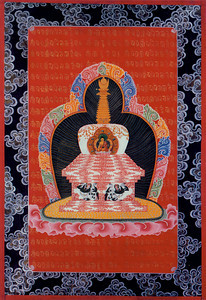
An excerpt from a teaching by Jetsunma Ahkon Lhamo called “How Buddhists Think”
The Buddha’s next teaching is that there exists a cessation of suffering, which is the same as the cessation of desire. This cessation is called Enlightenment, and it is the only true cessation of suffering.
In a very poor society, people focus on basic survival. But what happens in a society like ours, in which survival is not a main concern? (If nothing else works, we can go on welfare.) Since we don’t need to focus on survival, we have time to be neurotic. The more we seem to satisfy our needs, the more needs we develop.
In cyclic existence, there is no way to solve all our needs. Everything constantly changes. And temporary happiness is almost a mixed blessing: it always ends, and in the meantime, we are preoccupied with it. The problem is that we haven’t done anything about viewing our true Nature. It’s almost as if we keep ourselves satisfied by eating the icing off the cake; never really obtaining genuine nourishment.
When the Buddha taught that there is an end to suffering, it was a major revelation. Why? Although the great yogis and gurus at that time taught that one could achieve God-consciousness, cosmic consciousness, the Buddha superseded that. Due to the ripening of his great generosity in past lives, he was able to come to a level of meditation in which he realized the cessation of fixation––fixation on godliness and even fixation on the consciousness of self. He attained a level of realization that was simply “Awake.” No consciousness, no sameness, no union. Simply pure luminosity: “I am Awake.”
At that moment, all the cause-and-effect building blocks accumulated throughout time out of mind, all the building blocks from endless involvement with subject-object fixation, all the fixation on ego as real––all of this was pacified. The Buddha realized the sameness and indivisibility of subject and object, the inseparability of action and stillness, the sameness, the “Suchness” of all that is. All was dispelled in clear, uncontrived, luminous awareness. This non-specific awareness is the pure view of one’s own true Nature. It is simply being awake. The Buddha teaches that this is the end of all suffering, because it is the end of what you make suffering with. It is the end of cause-and-effect relationships––and therefore, according to Buddhism, the end of karma.
Copyright © Jetsunma Ahkon Lhamo. All rights reserved











2 thoughts on “Cessation of Suffering”